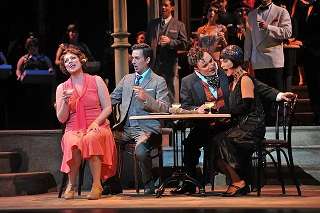|
Back
Another Company Premiere Miami
Adrienne Arsht Center for the Performing Arts
01/21/2012 - & January 24, 27, 29, February 1, 4, 2012
Giacomo Puccini: La rondine
Elizabeth Caballero (Magda), Bruno Ribeiro (Ruggero), Corinne Winters (Lisette), Daniel Shirley (Prunier), Craig Colclough (Rambaldo), Brittany Robinson (Yvette), Lacy Sauter (Bianca/A Singer), Courtney McKeown (Suzy), Ryan Milstead (Périchaud), Joo Won Kang (Crébillon)
Florida Grand Opera Orchestra and Chorus, John Keene (chorus master), Ramon Tebar (conductor)
Nicola Bowie (director), Ralph Funicello (set design), Camilla Haith (costume coordinator), Jeff Davis (lighting design)

(© Gaston de Cardenas)
Florida Grand Opera has been adventurous. In its twenty seasons before this one, the company introduced that same number of works to the repertory for the first time. This season, their 71st, opened with the company’s introduction to zarzuela (Luisa Fernanda). Now comes their first stab at La rondine, the only major Puccini work they have never mounted.
From its conception this opera has had trouble and American audiences have never taken to it. It’s Puccini, so naturally there are some beautiful things. The fault lies with an especially weak and uninteresting libretto, sort of a faux-Traviata. Usually the leads don’t generate a lot of heat and the secondary couple can be annoying.
And it must be emphasized that though Puccini was unsatisfied with the result and reception, he was quite vocal about being even less satisfied with the status quo and probably took satisfaction in the challenge of charting a new course instead of creating a Tosca knockoff. La rondine is the work of an innovator of musical theatre; this is reflected in the opera’s best number, “Chi il bel sogno di Dorettta.” Puccini didn’t play it safe; instead he wrote one of his most popular soprano arias, which sounds like nothing before it. There is much original and hummable music throughout even though the text is pretty inconsequential. But being Puccini, he is still able to make an interesting ending for this dreck. Magda and Ruggero get a final duet that sounds lifted from an early draft of Butterfly. Magda leaves and releases her final note offstage getting us choked up. Who can explain it? Who can tell you why? Perhaps just the genius of Puccini.
Any company interested in pursuing a production of a less established opera should follow Florida Grand Opera’s example by approaching it with complete though not overbearing sincerity. To offer a new production of this work in today’s economy is unthinkable, so Florida Grand Opera has chosen New York City Opera’s of 1984 which is charming and colorful though not lavish. Act One looks like a party given by one of Violetta’s less affluent friends, the second makes us think of the neighborhood where we might find the Café Momus and the last evokes the ambience of And God Created Woman. What more could one want? Director Nicola Bowie chose the 1920s as the setting giving us a much needed break from the mid-nineteenth century. Placing the action in the 20th century makes the female characters more independent; we know that after realizing that her affair can’t work, Magda will make out fine, she has become smart though not hard.
To best present La rondine, it is essential to have very strong singers. Here Florida Grand Opera made a great choice by offering Magda to Miami-raised and former Florida Grand Opera Young Artist, Elizabeth Caballero. Having already given Miami both La bohème sopranos, Liù, and Micäela, she is this show’s main draw. What this artist will bring to Manon Lescaut, Cio-Cio San, Tosca and even Minnie is something every company must be considering. Her Countess Almaviva, a few seasons back made it clear that this is an elegant performer and a fine actress with more than Puccini in her arsenal. Though Magda doesn’t have a lot to work with dramatically, she becomes a fully developed character when Caballero is at the helm. And the sheer beauty of her tone is something to relish.
Her Ruggero, Bruno Ribeiro, is no match for Caballero either vocally or dramatically, yet this works tremendously in the production’s favor as Magda’s honest sensitivity leads him into facing some of life’s unhappy truths. When Ruggero is thrown into desperation, his melodramatics border on the sappy; but with two leads playing so well off each other, the ending becomes extraordinarily moving
Corinne Winters has a ball with Lisette. In the first act she appeared to have some problems finding herself vocally but once in control, made the most of this role which is the model of a soubrette. Daniel Shirley was the greatest surprise of the evening. Prunier might not seem to be terribly interesting fellow but when Shirley was onstage it was hard to take one’s eyes off him. He seemed to be constantly moving and the voice is so pure that even in the softer passages he makes a very memorable impression.
This production also offers some real choreography in the second act. And with the classy flapper costumes, mirrored dance ball, moody lighting designs and some terrifically distinguished wigs and makeup design, La rondine becomes something of a snappy little Broadway musical. Yes, it is fun.
Any devoted opera goer should not miss this rare opportunity to see Puccini’s unusual little piece. The chance probably will not come again very soon and this production might have made even the maestro think more highly of his troubled opera. It is an exciting thing for any theatregoer to attend a performance with low expectations and to leave with egg on his or her face. Music Director Ramon Tebar conducted the performance with exceptional passion making noticeable even the most minor details.
Jeff Haller
|